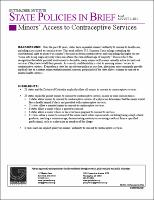Mostrar el registro sencillo del ítem
Minors’ Access to Contraceptive Services
| dc.contributor.author | Guttmacher Institute | |
| dc.date.accessioned | 2011-09-23T15:19:16Z | |
| dc.date.available | 2011-09-23T15:19:16Z | |
| dc.date.issued | 2011-08 | |
| dc.identifier.uri | http://clacaidigital.info/handle/123456789/187 | |
| dc.description.abstract | Over the past 30 years, states have expanded minors’ authority to consent to health care, including care related to sexual activity. This trend reflects U.S. Supreme Court rulings extending the constitutional right to privacy to a minor’s decision to obtain contraceptives and concluding that rights do not “come into being magically only when one attains the state-defined age of majority.” It also reflects the recognition that while parental involvement is desirable, many minors will remain sexually active but not seek services if they have to tell their parents. As a result, confidentiality is vital to ensuring minors’ access to contraceptive services. Even when a state has no relevant policy or case law, physicians may commonly provide medical care to a mature minor without parental consent, particularly if the state allows a minor to consent to related health services. | es_ES |
| dc.language.iso | en_US | es_ES |
| dc.publisher | Guttmacher Institute | es_ES |
| dc.subject | Anticoncepción | es_ES |
| dc.subject | Salud de los Adolescentes | es_ES |
| dc.subject | Acceso a los servicios de salud | es_ES |
| dc.title | Minors’ Access to Contraceptive Services | es_ES |
| dc.type | Other | es_ES |
Ficheros en el ítem
Este ítem aparece en la(s) siguiente(s) colección(ones)
-
Guttmacher Institute [33]
Guttmacher Institute



